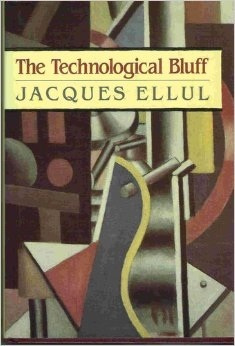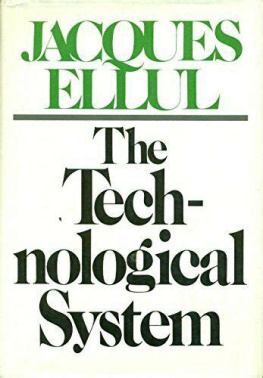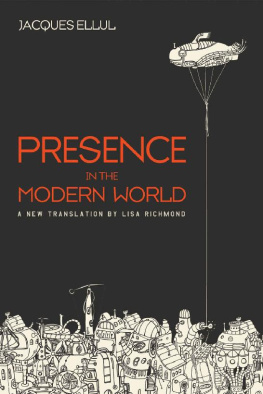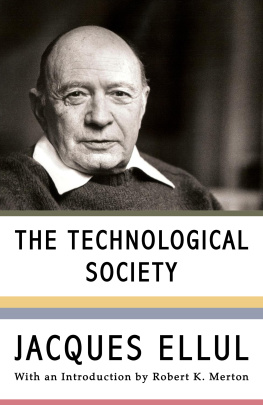Jacques Ellul - The Technological Bluff
Here you can read online Jacques Ellul - The Technological Bluff full text of the book (entire story) in english for free. Download pdf and epub, get meaning, cover and reviews about this ebook. year: 1989, publisher: W.B. Eerdmans, Grand Rapids, Michigan, USA, genre: Politics. Description of the work, (preface) as well as reviews are available. Best literature library LitArk.com created for fans of good reading and offers a wide selection of genres:
Romance novel
Science fiction
Adventure
Detective
Science
History
Home and family
Prose
Art
Politics
Computer
Non-fiction
Religion
Business
Children
Humor
Choose a favorite category and find really read worthwhile books. Enjoy immersion in the world of imagination, feel the emotions of the characters or learn something new for yourself, make an fascinating discovery.
- Book:The Technological Bluff
- Author:
- Publisher:W.B. Eerdmans, Grand Rapids, Michigan, USA
- Genre:
- Year:1989
- Rating:4 / 5
- Favourites:Add to favourites
- Your mark:
- 80
- 1
- 2
- 3
- 4
- 5
The Technological Bluff: summary, description and annotation
We offer to read an annotation, description, summary or preface (depends on what the author of the book "The Technological Bluff" wrote himself). If you haven't found the necessary information about the book — write in the comments, we will try to find it.
The Technological Bluff — read online for free the complete book (whole text) full work
Below is the text of the book, divided by pages. System saving the place of the last page read, allows you to conveniently read the book "The Technological Bluff" online for free, without having to search again every time where you left off. Put a bookmark, and you can go to the page where you finished reading at any time.
Font size:
Interval:
Bookmark:
The area of technique, technology, and the technological system is one in which Jacques Ellul undoubtedly speaks with a prophetic voice. Already events have justified many of his earlier warnings or even shown them to be too restrained. In this latest work, which rests on solid research and covers a wide and varied range of topics, his message comes through with unusual urgency and force. He might be mistaken on some of the details but this ought not to blind us to the truth in the general thesis. Conversely, even if we find the thesis implausible, this ought not to prevent us from hearing the challenge of the details. As Ellul sees it, either technology as a whole or individual technologies are hurrying us into a situation of catastrophe. Lulled by the bluff of technological discourse, we sleepily fail to perceive the perils that confront us. Ellul's purpose, therefore, is to jolt us awake before we pass the point of no return. A special concern, perhaps, is to awaken the timid churches that are paralyzed by their fear of being derided as old-fashioned and outdated.
Since most of the specific examples that Ellul adduces are taken from his native France, readers should be advised that in a few instances where explanatory footnotes might be needed the details have been omitted. The context will show what is meant in the case of some systems such as Minitel for which the United States has no existing equivalent yet. Established usage in English makes it difficult to retain the distinction that Ellul himself always makes and emphasizes between la technique (technique) and la technologie, (technology). It should be remembered, however, that in the title Ellul has the stricter sense in view, that is, technology as discourse, study, or system. The same applies, of course, to his discussion of technological terrorism.
Whether the powerful tocsin of Ellul can arrest the march of events may well be doubted, but in this regard Ellul has greater hopes, perhaps, from the New World than the Old. With the same sober optimism we present his exposure of the bluff to the English-speaking public.
Pasadena, Pentecost 1989 GEOFFREY W. BROMILEY
On seeing the title of this book some people might exclaim: "What! Another book on technology!" They would not be wrong. In 1950 I wrote a comprehensive study of "The Technical Society. This was meant to be the title, but the publisher, a sociologist, would not let me use it, stating that he himself was writing a work with this title, although in fact he never finished it. Hence my own book became La technique ou l'enjeu du sicle (1954; translated into English as The Technological Society). But at that time two important publishers had also rejected the manuscript on very similar grounds. What kind of a subject was this? they asked. Whom did I expect to interest in a subject that was no subject? Yet even at that time there were studies of the industrial mechanism (a model being the work of Georges Friedmann) and literary works on society that carried references to technique (e.g., G. Duhamel's unjustly forgotten Les scnes de la vie future). There were also works (e.g., Huxley's Brave New World) at a level much higher than the dreadful and stupid books and films, no less vulgar than misleading, that go by the name "science fiction. But there was nothing on technique itself, or on the society about to be assimilated by it. My book needed the influence of M. Duverger with a fourth publisher to appear finally in 1954. Today the wheel has turned full circle and there is a multiplicity of writings on the subject. Hardly a week passes without a work coming out on these questions in France.
Among such works I find three categories. First there are popular descriptive accounts of technique itself, usually of high quality, and dealing with specific subjects such as the computer or the laser and their application (e.g., the computer in schools or offices). Then there are lighter works consisting of essays on modern society under the impact of techniques and their rapid development (the consumer society, the computer society, the wasteful society), the upshot being that as technique achieves domination the society becomes one of networks rather than groups; we shall return to this idea. Finally, there are philosophical works. Since Heidegger and Habermas technique has become a primary theme in philosophy. Many philosophers are trying to understand the phenomenon (e.g., Crzuelle, Janicaud, Neirynck, Hottois) or to see what its influence is on the world (e.g., Baudrillard, Morin, Brun). I refer only to books in French! Thus some think that this book of mine cannot hope to say anything new. Nevertheless, I see some important things that have not yet been brought to light.
I am not going to repeat what I said in my two earlier works. But I will obviously begin with the conclusions I then reached and the phenomena I discerned. Only a few weeks ago an American sociologist told me how very relevant my first work on the subject still is. With no false modesty I can say that social, economic, and technical developments have confirmed in its entirety what I said thirty years ago. I have no need to correct or modify anything. Unfortunately, these analyses have been largely ignored in France, due to labeling. When my first book came out it was described as anti-technique, as hostile to progress, as reactionary. There was thus no point in reading my other books; their contents were known in advance. The Protestant world in particular has paid no attention to what I have written in this area. The label adequately described the product. It is true that many writers, without knowing their origin, have used analyses and conclusions of mine that have passed into common discourse (e.g., the neutrality of technique, or the ineluctable character of its development that escapes our grasp, or its universality). But the label remains. Although I was never against technique, and stated expressly that this would be absurd, and that I did not want a return to the Middle Ages, the label resulted from the rigor of my analysis, which gave to readers with a serene and superficial view of technique the impression of being in the presence of a strange, aggressive, and constrictive world. Obviously, someone who wrote in this way had to be an enemy of technique. They preferred the soothing language of advertising which argues that technique brings freedom.
A recent example of the game of labeling, which leads to two false conclusions, may be found in a work by A. Bressand and C. Distler who say that those who are most opposed to technology are now reexamining it. Thus Ellul now grants it the benefit of ambivalence. (A first mistake here is that I already granted it ambivalence in 1950, and this had nothing whatever to do with the fact that it offers us very useful and satisfying products, which I have never denied.) The first false conclusion is that of opposition to technique. That is just as absurd as opposition to an avalanche or to cancer. It is childish to say that someone is against technique. The second false conclusion concerns my work Changer de rvolution, which the authors quote but totally misunderstand. They say that I changed my view of technique because some new techniques serve the cause of decentralization and offer more free time. But I never denied this. The trouble is that they ignore half my argument. Some techniques can have positive effects so long as there is at the same time a change in society: the coming to power of a revolutionary socialism of liberty, which has nothing whatever to do with modern socialism or communism but demands a return to the ideas of Proudhon and Bakunin and a serious consideration of those of Castoriadis. Also demanded is a basic socioeconomic upheaval (e.g., in remuneration and distribution). Previously, there was no way to do this, but new techniques make it possible, though naturally they do not bring it about automatically. In saying this I was not reexamining any of my previous analyses. I was simply pointing out that change is possible if a politico-economic about-face goes hand in hand with the new techniques. I was also pointing out that the time was short in which to do this, perhaps only months, at most only a few years. Those years have now passed. It is now too late to change the course of technique. We have lost a decisive opportunity in human history.
Font size:
Interval:
Bookmark:
Similar books «The Technological Bluff»
Look at similar books to The Technological Bluff. We have selected literature similar in name and meaning in the hope of providing readers with more options to find new, interesting, not yet read works.
Discussion, reviews of the book The Technological Bluff and just readers' own opinions. Leave your comments, write what you think about the work, its meaning or the main characters. Specify what exactly you liked and what you didn't like, and why you think so.









